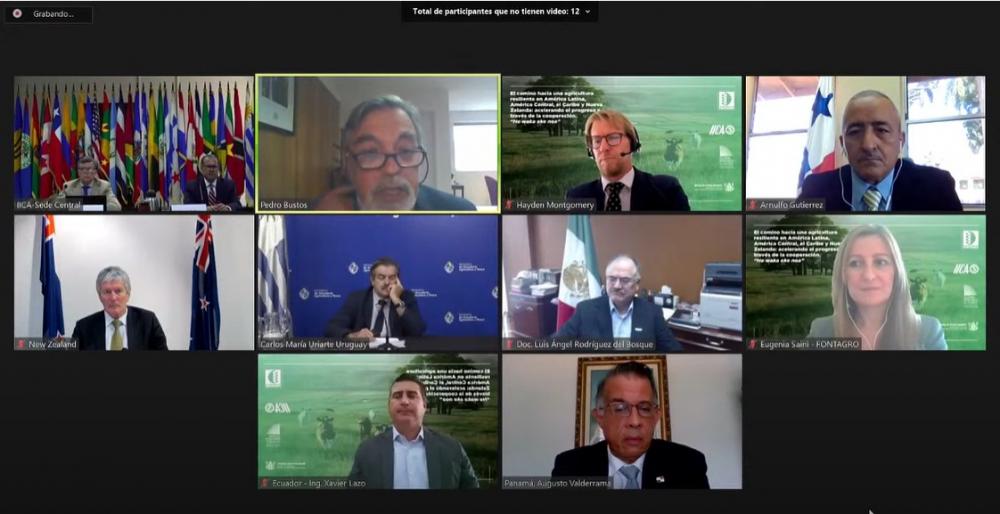New Zealand, Latin America and the Caribbean: cooperating to position sustainable livestock production and to boost resilience in agriculture

San Jose, 25 February 2021 (IICA) – The ministers of Agriculture of Chile, Costa Rica, Ecuador, New Zealand, Panama, Paraguay and Uruguay, along with FONTAGRO and the Inter-American Institute for Cooperation on Agriculture (IICA), stressed the economic, social and environmental importance of the agriculture sector, particularly livestock production, during an event that highlighted the need for investment in science and technology and promotion of inter-institutional collaboration for sustainable development.
The FONTAGRO-IICA-Global Research Alliance (GRA) event—"The path to resilient agriculture in Latin America, Central America, the Caribbean and New Zealand: accelerating progress through cooperation. ´He waka eke noa´”—organized in collaboration with the Government of New Zealand, focused on agricultural greenhouse gases. “He waka eke noa” is a Maori expression meaning, “We are all in the same boat”.The participating ministers and authorities; as well as Eugenia Saini, the Executive Secretary of FONTAGRO—a cooperation mechanism to promote science, development and innovation in the Latin American and Caribbean agriculture and food sectors—and IICA Director General, Manuel Otero, were all of one accord that agricultural and livestock production should be positioned as part of the solution amidst environmental challenges and the quest for new avenues for sustainable development, in a framework of cooperation and investment in science and innovation.
Chile’s Minister of Agriculture, María Emilia Undurraga, therefore stressed the critical importance of “positioning the livestock and agriculture sector as one that is part of the solution to climate change and a means of sustainable development, rather the problem”.
In addition to Minister Undarraga, other ministers of agriculture attending the meeting were Renato Alvarado from Costa Rica; Xavier Lazo Guerrero from Ecuador; Damien O'Connor from New Zealand; Augusto Valderrama from Panama; Santiago Bertoni Hícar from Paraguay and Carlos María Uriarte from Uruguay. They deliberated on how to support the building of a more resilient, sustainable and inclusive livestock industry and stressed the importance of science, innovation and the promotion of inter-institutional collaboration.
Representatives of FONTAGRO and the GRA informed the meeting about their organization’s research initiatives and ongoing cooperation efforts. A priority of the GRA is to seek out the best scientific information to generate Nationally Determined Contributions (NDCs), in the context of the Paris Accord, to reduce carbon dioxide emissions in the atmosphere.
Pedro Bustos, President of FONTAGRO and National Director of Chile’s Agricultural Research Institute (INIA), maintained that “Collaborative efforts are critical to implementing production intensification models that are environmentally-friendly. In 2020, we were faced with COVID-19 and the effects of climate change. This has demonstrated the increasing need for joint efforts in science and technology development, such as the alliance, led by FONTAGRO, IICA and the Government of New Zealand, to respond to the needs of the agrifood sector in their associated countries”. He continued by saying that, “We must invest in science and research in a collective manner”.
On the other hand, the IICA Director General, underscored the importance of livestock and dairy production and their role in job creation, indicating that, “Maintaining our position and tackling the challenges of competitiveness and sustainability call for the generation and incorporation of science and technology as a matter of urgency, in this region in which investment lags far behind what is needed”.
Moreover, Otero issued an appeal for the strengthening of national science and technology systems to invest in building production systems in harmony with nature. He referred to two events that would offer important opportunities to align discussions and decision-making with respect to agriculture-related issues: the Meeting of Ministers and Secretaries of Agriculture of the Americas, IICA’s highest governing body, slated to take place on 1-2 September, followed by the UN Food Systems Summit at the end of that same month. “It will be a critical year to position the agriculture and livestock industries of Latin America and the Caribbean”, said Otero.
Paraguay’s Minister of Agriculture called attention to the importance of communication. “We are producing and exporting countries and the livestock industry represents an important part of our economy. We are also consumers, as meat features in the diet of our people. We are concerned about the outcry regarding changing eating habits. Thus, we must seek to arrive at more united and coordinated positions and to improve our communication to the public that is receiving information that is not scientifically based. We are all on the same wavelength and it is our responsibility to work on strategies to communicate to the world about sustainable production systems in the region”, said Bertoni.
New Zealand’s Minister of Agriculture expressed satisfaction with the work by the GRA and FONTAGRO to assist in sharing knowledge with Latin America and the Caribbean, indicating that, “Together we have worked to improve agricultural productivity, as well as the measurement and reporting of greenhouse gas emissions, particularly from livestock”.
Minister Uriarte of Uruguay emphasized the strategic importance of Latin America as a provider of “abundant and high-quality” food, pointing out that “the greatest challenges that we face is make ourselves more visible in this role”.
Also present at the event were Arnulfo Gutiérrez, Vice-President of FONTAGRO and Luis Ángel Rodríguez Del Bosque, Director General of Mexico’s National Institute for Forestry, Agriculture and Livestock Research (INIFAP).
Along the same lines, Ángelo Quintero, Director of Innovation in Colombia’s Ministry of Agriculture, explained that his country had been aiming to “establish sustainable production systems, focusing on a low water and carbon footprint, which is achievable through inter-institutional efforts, starting with the farmer”.
More information:
Institutional Communication Division
comunicacion.institucional@iica.int